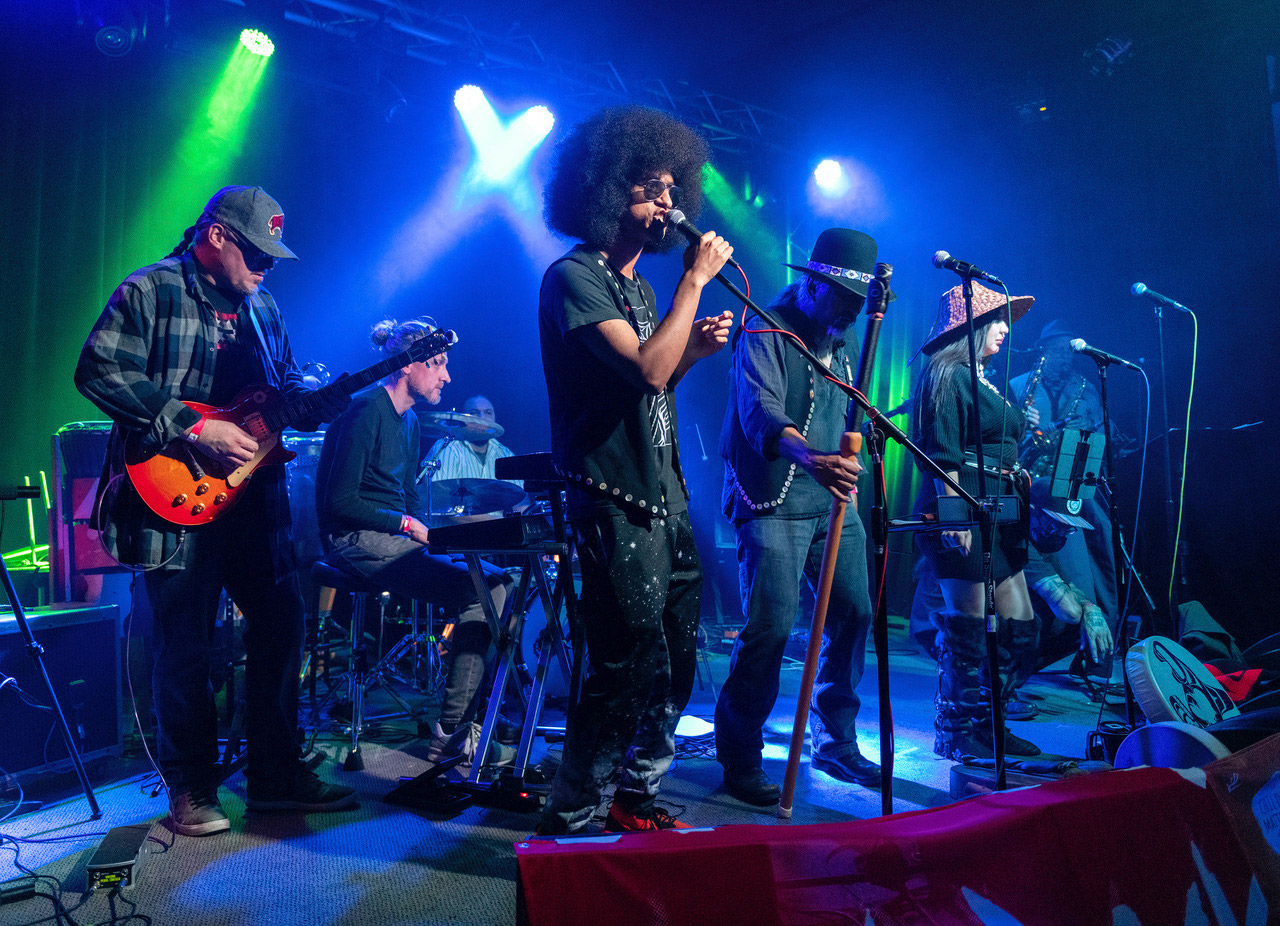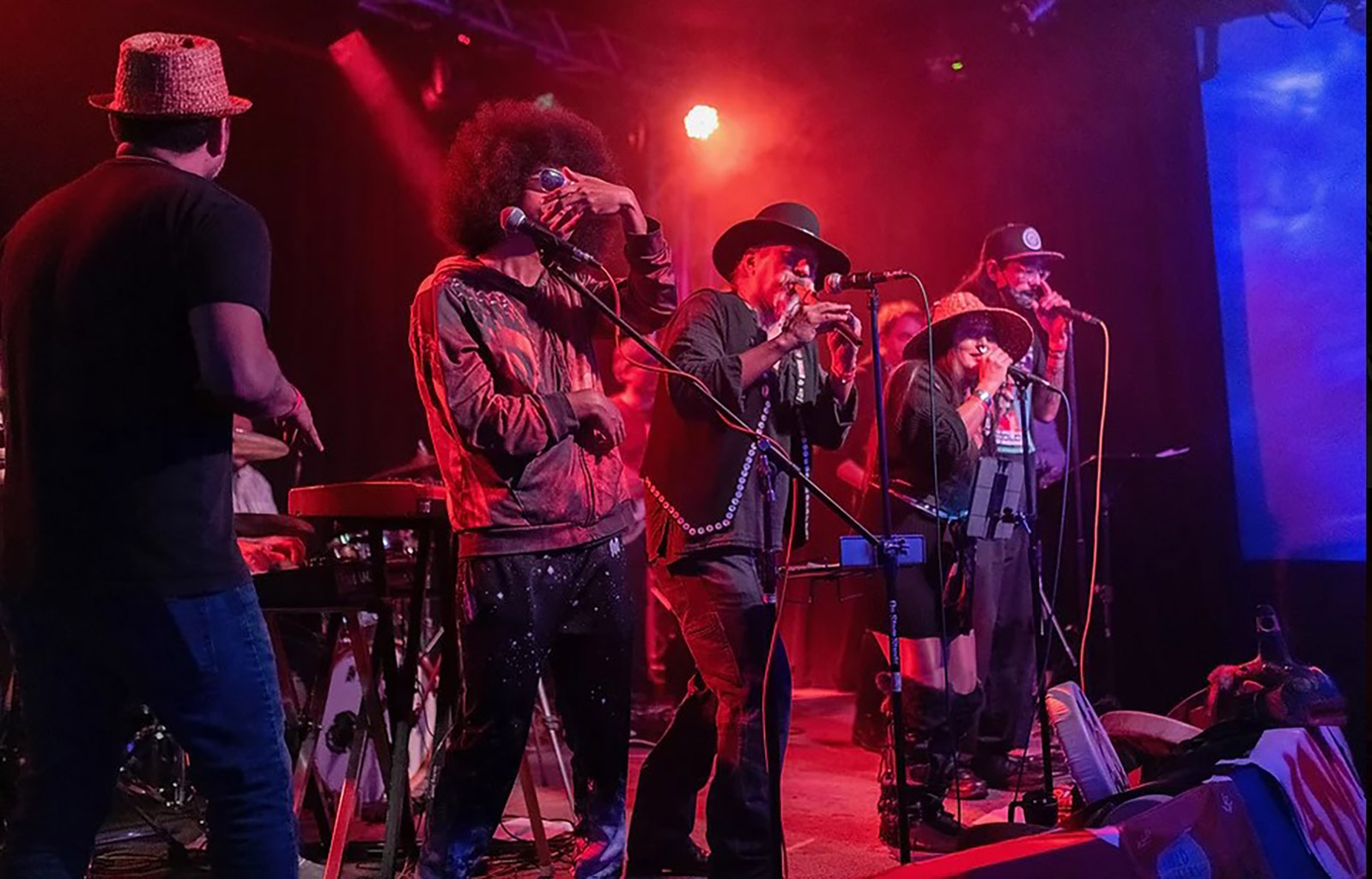Khu.éex’ Band Interview: Uplifting Alaska Native Culture with Genre-Defying Musical Fluidity - REDEFINE magazine - music art film journalism - reviews, interviews, features (original) (raw)
Khu.éex’ (pronounced koo-eek; “potlatch” in Tlingit) is a 10-piece intergenerational band whose musical style is fluid, with improvisational prowess that allows them to span genres as wide-ranging as funk and hip-hop to jazz and spoken word. With members spread throughout the Seattle region to as far up north as Bellingham and Juneau, Alaska, they are a project with a majority Native membership and a penchant for singing in Tlingit and Haida.

Khu.éex’ perform at the High Dive in November 2021, with Tlingit rapper and vocalist Arias Hoyle, or Airjazz, on vocals. (Credit: Spike Mafford)
A Fluid Exploration of Theme
Khu.éex’ has four LPs under their belt and have recently recorded their fifth with producer Randall Dunn, which is as of yet untitled and likely to be released in 2023. Thematically, the upcoming album will be focused on the Urban Native experience, as many of the band members have tribal affiliations but are not from tribes of this region.
“One of the big themes… is [of] being tribal people from a place other than Seattle, but growing up in the Seattle area, and the experience of being displaced tribal people in Seattle… and kind of painting a picture of what it’s like to grow up as a Plains person in Seattle or Alaska Native in Seattle, and… what you encounter,” explains Captain Raab, of Siksika descent, who is a guitarist and multiinstrumentalist; he is often also called the band’s musicologist. Raab came to Khu.éex’ after being a touring member of a legendary Native band called Red Earth, based out of Albuquerque.
“With all respect to the tribes that are from the Puget Sound area… all of us who are Native people in Khu.éex’ [are] from tribes that are not from Seattle,” shares Raab. “Within the band, we have a shared experience of, you know, what’s it like being a displaced — or you know, relocated — tribal person, you know, in a land where… there are also the people that are Indigenous to that specific spot.”
The themes that Khu.éex’ explores on their records are not always clear from the outset; they often emerge intuitively from the creative process. 2020’s Héen — “water” in Tlingit — was created in the period during the Standing Rock battle between Indigenous groups and the Dakota Access Pipeline (DAPL). With a cover that features a Tlingit person cosmically floating atop a background of ocean waves, the album opens with a funky synth-and-flute laden track entitled “Song to the Water Protectors,” while 13-minute epics like “Killer Whale Creation” are moody spoken word offerings of Alaska Native folklore, in a combination of Tlingit and English.
“It wasn’t even really intentional. I think we kind of just go with the flow. After we finish recording, we kind of look at: what are the common threads… [and ask,] what does the music want itself to be?” explains Raab. “We try not to box it in… until we’re kind of into the mixing stage… [when] it’s kind of showing itself [as] what it is.”
A Vibrant Mix of the Traditional and Contemporary
During Khu.éex’s very first recording session in 2016, they entered the studio to simultaneously begin work on what would eventually be two triple albums, including Héen and 2021’s WOOch — “together” in Tlingit. These two records would be the last featuring keyboardist and Khu.éex’ co-founder Bernie Worrell, who passed in 2016. Worrell was a founding member of Parliament-Funkadelic and contributor to numerous Talking Heads albums; the incorporation of “WOO” in all caps spoke to his philosophy of using music to bring people together through sound. The record itself focuses on the concept of “the Alaska Native communities’ shared experiences” and “explores the connection between historical and contemporary issues and intergenerational strength in the face of trauma.”
Worrell’s impact on the band and its members has been significant. The band’s other co-founder, bassist Preston Singletary, is a Tlingit glass artist well-known for his sculptural work. Singletary had already been playing with Native musicians for years when he met Worrell in 2013.
“The story goes… when I met Bernie, it was a Kickstarter campaign that was trying to fund a tour bus for him. You know, he was like, 69 [or] 70, and he was still touring with the Bernie Worrell Orchestra,” recalls Singletary.
The campaign had a level where one could donate and have Worrell drive his bus to their city; Singletary jumped at the offer. After Singletary told Worrell’s wife, who was his manager, about his art and band, she suggested that they open for Worrell, and Singletary made sure they were available to play the gig.
“The night of the party, I sang a traditional song, and I had my hand drum, and I was singing… [Worrell] took that melody, and he started sort of improvising on it,” shares Singletary. “He played his organ, and it became the symphonic thing… he started playing synthesizers, and that was turned into this psychedelic rock thing… he’s really known for that — just improvising.”
It was an eye-opening experience for Singletary, who realized that direction was exactly where he wanted to go: taking traditional songs, figuring out the chord structure beneath them, and putting additional instruments underneath the melody. Worrell expressed an interest in collaborating, and Khu.éex’ had their first improvised recording session, including Singletary, Worrell, saxophonist and pianist Skerk, Native storyteller Gene Tagaban, drummer Stanton Moore, and the late Clarissa Rizal, a Tlingit weaver who passed in 2016.
“[Rizal] was… a real spiritual person, and so trying to mix the music, and the culture… I really wanted to have her to see how we could kind of navigate that and bring something special to the music,” Singletary says, describing her as a mentor.
Both Rizal and Tagaban, who had been raised in Juneau, had worked for a group where they had learned and presented old Tlingit stories as theater.
“Some of the songs are considered clan property… it’s like intellectual property, owned by a specific clans, and that represents the clan, but some of them we kind of perceived as being in the public domain, so to speak, and that other people from other clans will use the songs,” shares Singletary.
Khu.éex’ started with a shortlist of those particular songs and had already recorded them when one of the younger members of the band suggested that they talk to the clan leaders about using the songs, out of respect and protocol. Singletary retroactively went out to clan leaders to ask for permission and they were able to use all except two.
Tagaban, who comes from a storytelling tradition, was able to incorporate a mix of Tlingit words, poetry, and storytelling into Khu.éex”s numerous spoken word pieces. All of it emerged through improvisation. The band would launch into a certain key, and Tagaban would just begin speaking.
“If you listen, you can hear, you know, the call and response almost… Bernie was really good at that… Gene would say a phrase, and then, and then he would kind of come in over the top. And sometimes it would kind of elicit kind of a feeling of… whatever he was talking about, and he was so quick on his feet with all of that,” says Singletary. “It was amazing to see that.”
An Intergenerational Approach to Revitalize and Preserve Culture
Khu.éex”s lineup has changed a bit since their first recording session in 2016, though some of the same members remain. Raab was brought in during the second session, and today’s lineup includes Singletary, Skerik, Tagaban, Raab, and newer members such as percussionist Denny Stern, keyboardist Tim Kennedy, drummer and vocalist Ed Littlefield, trombonist Jason Cressey, Haida vocalist and hand drummer Sondra Segundo, and Tlingit vocalist and rapper Arias Hoyle, aka Airjazz. Airjazz and Segundo are evolving language in unique ways within the band, with Airjazz pursuing fluency in Tlingit and presenting it through rap, and Segundo reinterpreting some gospel songs into Haida.
Khu.éex’ has what Raab describes as a “family atmosphere” uncommon with many bands, perhaps due to the fact that they have members as young as Airjazz, who is in his early 20s, while also having members who are grandparents.
“It’s cool having such a wide range of generations within the band, and I think that is another reason… why this group sounds different than I think other groups I’ve been in…” explains Raab. “You introduce an elder into a group, and it’s a different energy; if you’re an older group, and you have somebody really young join the group, that infuses other energies. It’s cool having that many dynamics at play, and it always keeps it really keeps it really interesting and feeling really grounded.”
With so many active members — most of whom have other projects in music, art, and activism — it is a boon that Khu.éex’ has members who are masters of improvisation. They are able to pull off technically-proficient shows with very little rehearsal time, which allows the band members to live their full lives as creators that span genres and disciplines.
“When you look at Native communities, the people who are… the songkeepers… there’s nobody, that’s just a musician…” says Raab, who mentions that a musician might also be a fisherman or have another role in the community. “It’s a really Western way of thinking to be where you’re just a musician, and nothing else. And if you’re not just a musician without a day job, then you’re not really a true musician…”
For a band like Khu.éex’, whose music is an Alaska Native language revitalization tool, and whose self-professed focus is “raising awareness of social issues, stemming from the Native American struggle, that branch out to serious issues that [a]ffect all people,” having a flexibility of roles and worldviews is vital.
“If you have an artist role, but then you have another role, like, maybe as a social worker, or whatever… you’re gonna have more things to communicate through the music than if you’re just… boxed in as just being a musician,” says Raab. “We’ve really wanted to have the music be really deep and about something and be something that… 30 years down the road… people could listen to the music and you have some insight as to what was going on in Indian country.”

Khu.éex’ perform at the High Dive in November 2021, with Tlingit rapper and vocalist Arias Hoyle, or Airjazz, on vocals. (Credit: Spike Mafford)
Ω